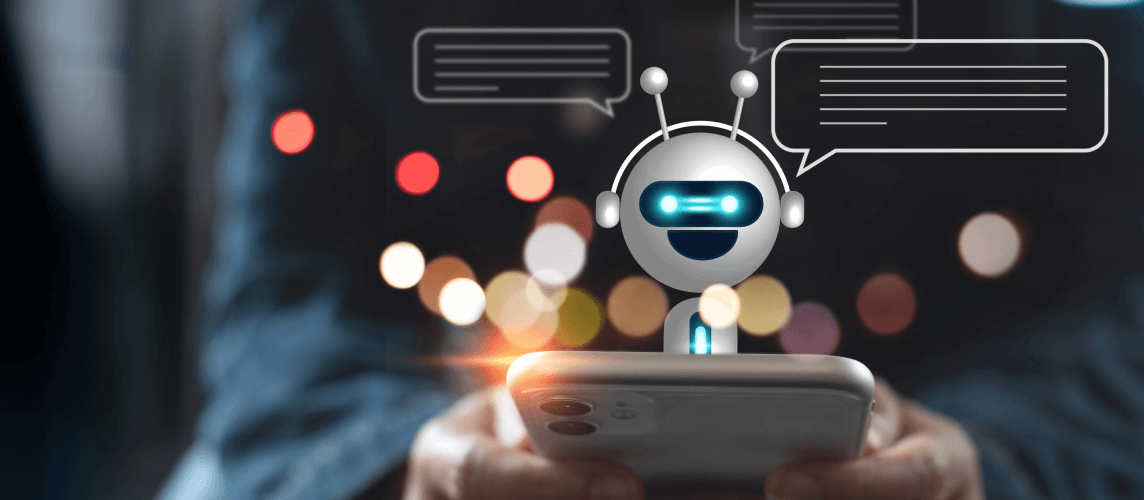AI revolution in customer service: How are new technologies changing the e-commerce industry?
Groundbreaking innovation powered by artificial intelligence: Discover how AI technology is transforming the customer experience and shaping the future of e-commerce.
Artificial intelligence is opening up new opportunities and setting trends in many aspects of business operations. Its enormous potential for automation, personalization, and efficiency is changing how businesses operate and revolutionizing customer service.
In this article, we will explore the most promising applications of AI in customer service, focusing on the role of Chat GPT. We will examine how this tool can enhance the effectiveness of customer interactions and increase your team's efficiency in communicating with customers.
Additionally, we will discuss the potential challenges and limitations that companies may face when using AI, while also highlighting its benefits.
Chat GPT - how to use it?
Chat GPT is a system that allows for having a conversation as if you would talk to another person. The system uses artificial intelligence to analyze your text input and generate responses based on its accumulated knowledge.
Its functionality is based on advanced natural language processing, so to get the most out of the system, it is essential to follow some key rules when formulating questions or "prompts." These rules include:
- Asking specific questions
- Using keywords
- Avoiding complex sentences
- Determining the role and context
- Avoiding abbreviations – they may not be known to the language model
- Avoiding phrases like “What do you think..?”
To make things easier, it's helpful to familiarize yourself with sample prompt patterns, such as:
1. Act like [ROLE]. Develop [CONTENT TYPE] based on [KEYWORDS], but do not [ELEMENTS TO AVOID].
Act like an [e-commerce manager]. Based on [sales data analysis], develop a [promotion strategy for low turnover products], but do not include [price discounts].
2. Summarize [SUBJECT]. Write a summary in the form OF [TYPE OF SUMMARY].
Summarize [E-commerce Trends in 2023]. Write a summary in the form of [abstract].
3. Resolve a [CUSTOMER ISSUE] with [PRODUCT/SERVICE]. Formulate the answer in the form of [MESSAGE TYPE].
Resolve [customer issue] regarding [order delivery delay]. Formulate the answer in the form of [email to the customer].
These prompt patterns are just examples, so it is important to remember to follow the rules mentioned above, especially when making specific requests.
How to use Chat GPT for customer service?
- Cross-cultural translation and communication
Chat GPT can help companies communicate with customers speaking different languages by translating text in real time.
- Automated customer service
In customer service, answering questions quickly is critical. A chatbot powered by AI can automatically answer frequently asked questions, freeing customer service employees to focus on more complex tasks. This allows customers to get immediate answers to their questions.
- Internal AI-powered knowledge base
Internal knowledge bases supported by artificial intelligence can provide consultants with relevant information on the fly, allowing them to provide accurate answers and improve customer service by increasing data availability.
- Routine task reduction
Chat GPT can help customers with routine requests such as changing their password, updating their contact information, or checking their order status, guiding users step by step through the processes, thereby saving valuable customer service department time and increasing business efficiency.
- Data analysis
Chat GPT can analyze conversations and identify patterns. This can be useful for making business decisions and better understanding customer needs and expectations. For example, artificial intelligence (AI) can create an accurate customer profile by using existing data and integrating information from multiple sources and communication channels. By creating an accurate profile of your customers, you can better understand their needs and preferences and provide more personalized and effective service.
- Generating customer communication email templates
Chat GPT can help businesses create personalized messages and templates to engage customers more effectively, and provide them with valuable content and information.
- Helping demanding customers find solutions
When a problematic client presents a complicated problem, GPT Chat will not be swayed by emotion and will approach the situation with professionalism. It will try to understand what the customer needs and try to provide answers or solutions that will help solve the problem.
- Quickly generate suggested content for leads
Chat GPT can streamline sales by instantly suggesting content to potential customers. For example, suppose a customer expresses interest in a particular website. In that case, Chat GPT can provide several different content suggestions in a similar style and tone, even at the commercial negotiation stage. This allows the company to offer more options to the customer without a significant increase in work, as the chat automatically generates the suggestions.
- Competition analysis
Chat GPT can identify competitors of potential or existing customers and perform competitive analysis. As a result, businesses can better understand the market and factors affecting customers.
How can Chat GPT improve employee productivity?
Artificial intelligence can help companies improve their customer service and boost employee productivity. By automating repetitive tasks, AI technology allows employees to focus on more complex issues, establish better customer relationships, and enhance problem-solving abilities.
AI-powered chatbots can handle routine inquiries, freeing up staff to tackle more challenging tasks that require human skills like empathy and creativity. With partial automation, customer service employees can manage their time more efficiently, and work on tasks that add more value to the business.
As a result, AI technology becomes an invaluable tool that supports and empowers employees, leading to improved customer satisfaction and business growth.
What are the benefits of introduction AI tools for customer service?
Chat GPT and other related AI-powered tools offer a range of benefits to customer service departments. These include:
- 24/7 Availability and fast response times – Chat GPT generates responses quickly, providing customers with almost instant answers anytime. This is particularly important for companies serving customers in different time zones.
- Increased customer satisfaction - Providing customers with quick answers to their questions enhances their experience with the company, leading to loyalty and positive feedback.
- Increased response accuracy - AI-generated responses are often more precise and free of human error, elevating the quality of customer service.
- Cost reduction - Implementing AI technology can help reduce the costs associated with customer service in the long term, including reducing the need to hire additional employees.
- Employee support - By freeing employees from repetitive tasks that don't require a complicated response, they can focus on more complex problems.
- Integration with other systems - Chat GPT can be integrated with other systems, such as contact centers or customer relationship management (CRM) systems.
- Personalized customer experience - Language model-generated responses can be better tailored to the individual needs of each customer.
- Processing large amounts of data - AI tools are excellent at processing large amounts of data in a short amount of time, enabling effective analysis of customer feedback and better service provision.
Together we will analyze your needs and advise you
on how to increase the efficiency of your e-commerce.
Notable customer service AI tools
AI-powered tools are revolutionizing the customer service industry. Apart from GPT Chat, there are several other tools that are being used in this field. Here are a few examples:
- Echowin - This telephone service automation solution provides 24/7 call automation. The tool has the ability to understand natural language and track customer interactions in real time. With Echowin, customer service and business processes can be streamlined.
- SuperReply - This tool is designed for responding privately and effectively to emails. It automatically creates responses tailored to the message's context and tone. Message encryption is also included to protect user privacy.
- Mailyr AI - his Chrome extension is based on ChatGPT technology and makes it easier to write emails in Gmail. With Mailyr AI, users only need to type a few words and let the artificial intelligence take care of the rest, saving time and making email creation more convenient.
- Twain - This AI-based tool enhances email content by providing recommendations for improving content. It suggests creating an engaging start to the message, eliminating unnecessary words, and adding straightforward questions at the end of the email.
- Midjourney - This popular AI-based image generator creates different visualizations based on user-entered descriptions.
Artificial Intelligence - limitations and challenges
Although introducing artificial intelligence into customer service may seem like the perfect solution, it has some drawbacks that can create several challenges for organizations. These challenges include:
- Customer resistance to automation: Customers may resist the introduction of artificial intelligence into customer service, which requires organizations to educate and build their trust in the technology.
- Lack of human emotion and empathy: Artificial intelligence cannot display emotions, making customers feel less understood and served.
- Ethical considerations: It is necessary to monitor and control AI to avoid situations where the generated content is inappropriate or immoral.
- Security of company data: Processing customer data by AI involves privacy risks and cyberattacks.
- Language barriers: AI may not always provide accurate translations or understand different dialects and accents, leading to customer misunderstandings. Lack of creative thinking: AI operates on algorithms and data, which may limit its ability to solve unusual problems.
- Off-topic errors: AI may answer questions inappropriately or too broadly, without always focusing on the customer's main question, causing customer frustration.
- Technical unreliability: Technical failures may result in AI's unavailability, affecting customer service availability.
- Continuous update required: AI requires regular updates and improvements to maintain its effectiveness.
- Regulatory and legal requirements: Currently, the content generated by the artificial intelligence system is not regulated in Poland in the context of copyright.
- Understanding complex problems: AI may have difficulty solving more complex issues that require human thinking and creativity.
- High initial cost of implementing AI technology: Implementing AI in customer service can require an increased capital investment, which can be a barrier for some companies.
- Need for bot training: Implementing and training an AI system requires time and resources to ensure its effective operation.
AI tools - what does the future hold?
Artificial intelligence is expected to play an increasingly important role in customer service.
This will be driven by the evolution of AI technology itself, as well as changing customer expectations and increasing market competition.
The key trend will be to provide more personalized service, and intelligent chatbots will become more communicative and effective at resolving customer issues. AI can also analyze customer sentiment during interactions, contributing to more "human-like" service.
Conclusion
AI-powered tools like GPT Chat significantly contribute to customer service transformation. They offer many advantages, such as streamlining processes and providing immediate responses, ultimately increasing customer satisfaction. However, it is crucial not to overlook potential risks, such as ethical concerns and data security. These risks must be considered and addressed in customer service strategies.




















